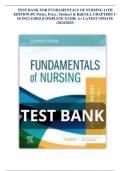Exam (elaborations)
TEST BANK FOR FUNDAMENTALS OF NURSING 11TH EDITION BY Potter, Perry, Stockert & Hall/ALL CHAPTERS 1-50 INCLUDED |COMPLETE GUIDE A+ LATEST UPDATE (2024/2025)
- Course
- Institution
- Book
TEST BANK FOR FUNDAMENTALS OF NURSING 11TH EDITION BY Potter, Perry, Stockert & Hall/ALL CHAPTERS 1-50 INCLUDED |COMPLETE GUIDE A+ LATEST UPDATE (2024/2025) Chapter 01: Nursing Today Potter: Fundamentals of Nursing, 11th Edition MULTIPLE CHOICE 1. Which caregiver most likely kept records o...
[Show more]



